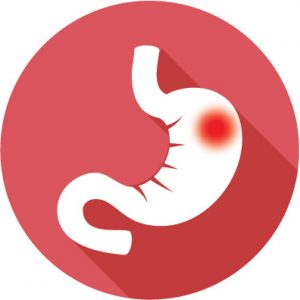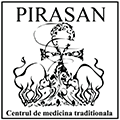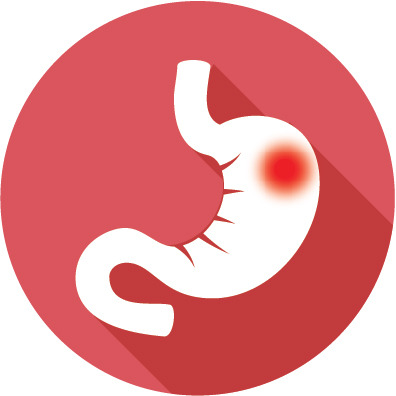Ulcer is defined as a disease of the skin or of the mucous membranes, manifested in the form of lesions that do not cicatrize, with tendency towards suppuration and growth.
It is found in all ages under various forms of manifestation, but lately there has been recorded a higher incidence of peptic ulcer in young people.
The types of ulcer are classified depending on their location:
- In the lower limbs, caused by vascular insufficiency (most times this type of ulcer is a complication of varicosis);
- Subungual ulcer is caused by the pressure exerted upon the nails (this type of ulcer usually occurs in the diabetics);

- Sacral area decubital ulcer (it occurs in patients confined to bed);
- Aphthous ulcer
- Peptic ulcer (located in the lining of the esophagus, of the stomach and of the duodenum)
- Genital ulcer (located in the area of the penis, the vulva or the labia, generally caused by sexually transmitted diseases);
- Corneal ulcer and conjunctival ulcer (located in the area of the eyes);
The most common cases are of peptic ulcer. It is manifested as a persisting pain or a burning/gnawing sensation located between the navel and sternum. Sometimes the pain radiates throughout the entire abdominal and the lumbar area. The patient loses weight complaining of loss of appetite, nausea, bloating after meals, vomiting.
Digestive hemorrhage is the most common complication of peptic ulcer. Massive bleeding leads to hematemesis and melena, both cases endangering a patient’s life. Hematemesis is manifested by vomiting episodes; the eliminated liquid is mixed with blood or it has the aspect of dregs. In the case of melena the blood is eliminated through the excretory system as a very dark-colored stool. These manifestations are accompanied by heavy fatigue.
How does peptic ulcer occur?
The stomach’s walls are lined by a mucous membrane, with a role in the secretion of gastric juices (pepsin and hydrochloric acid are the main substances involved in food digestion). In order to protect the stomach walls of the gastric acids’ corrosive action, an antacid barrier is secreted. The integrity of the digestive system or of the antacid barrier being affected will create a good environment for the growth of Helicobacter Pylori bacteria. The bacteria will set in the area with the lowest immunity, eroding the antacid barrier. The phenomenon is increased by the corrosive action of the gastric juices. The mucous membrane’s function is disturbed; there is an excess secretion of hydrochloric acid (this is the reason why the patients with peptic ulcer complain of continuous hunger sensation). The ulcer sets in when the bacteria has penetrated the antacid barrier and the gastric mucous membrane, injuring the digestive walls.
In most cases, the peptic ulcer is caused by physical and psychic exhaustion as well as by the action of several other very powerful stress factors. Under these circumstances, the liver’s activity is disturbed, and the gall bladder no longer secretes bile at the right moment. Normally, the gastric juices are secreted upon food ingestion and the bile when the digestive bolus has reached the stomach. If the bile is secreted later, the food will spend a longer time in the stomach and it will begin to ferment, injuring the gastric mucous membrane and allowing the Helicobacter Pylori bacteria to grow.
Which factors lead to the destruction of the antacid barrier?
Stress is the main factor. Most times it is coupled with a disordered lifestyle and an unhealthy or chaotic diet. Excess smoking and consumption of coffee or of other caffeine-containing products, alcohol consumption – all these upset the antacid balance. Research has shown that also a number of anti-inflammatory drugs (Ibuprofen, Aspirin, Diclofenac, Ketoprofen, Indomethacin, and Prednisone) may have similar effects.
How could I find out whether I have ulcer?
In the traditional medicine, the information that help establish the diagnosis of peptic ulcer is gathered by pulse interpretation, facies and tongue examination, plus anamneses (patient’s medical history).
What are the treatment options?
In the traditional medicine, the treatment of peptic ulcer involves two ways of action: by traditional therapies and by diet. Acupuncture and phytotherapy are used to:
- heal the lesions and regenerate the areas eroded by Helicobacter Pylori bacteria
- restore the antacid balance and the digestive system’s immunity
- annul the conditions favorable for the growth of Helicobacter Pylori bacteria
The role of the diet is to provide the body with all the necessary nutrients for its recovery in the first place and to protect the digestive system throughout the duration of the treatment. Therefore only aliments are recommended that are boiled, cooked in the oven or grilled; no roasted food and no fats. Raw vegetables and fruit will be avoided, but they may be had boiled. Beef or pork takes a longer time to digest, therefore only chicken and fish are recommended for comsumption. The following are completely forbidden: consumption of fizzy juices, fast-food, coffee, instant coffee, smoking and chocolate.

